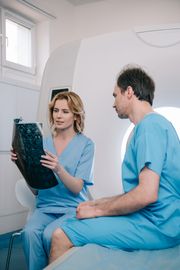
The kidneys remove waste and excess fluid from the body, and small tubules in the organ make this process possible. However, cells may grow uncontrollably in the tubule lining, causing renal cancer. This is the most common type of kidney cancer in adults, and if you’re unfamiliar with the disease, use this guide to get informed so that you or a loved one is prepared if diagnosis occurs.
Causes & Symptoms
Scientists aren’t sure what causes renal cancer. However, it’s more prevalent among men between the ages of 50 and 70. Certain factors may increase your chances of getting the disease—this includes obesity, smoking, and abusing ibuprofen or aspirin. People with a family history of the disease and hypertension, or those who have had a dialysis treatment, are also at a heightened risk.
Symptoms of renal cancer include a lump in your abdomen, blood in your urine, vision problems, fatigue, loss of appetite, anemia, and night sweats.
Diagnosis
 To check for renal cancer, a doctor will inquire about the patient’s family history and conduct a physical exam to look for lumps in their abdomen. If the initial examination suggests renal cancer, the doctor will order tests to get a clearer and more accurate diagnosis. Testing may include a CT scan, blood count, urine examination, and biopsy. If the results are positive, more testing will be done to determine the stage of the disease.
To check for renal cancer, a doctor will inquire about the patient’s family history and conduct a physical exam to look for lumps in their abdomen. If the initial examination suggests renal cancer, the doctor will order tests to get a clearer and more accurate diagnosis. Testing may include a CT scan, blood count, urine examination, and biopsy. If the results are positive, more testing will be done to determine the stage of the disease.
Treatment
Treatment will always vary depending on the cancer’s stage. There are a few standard treatments that may be used, sometimes in combination, to address the disease:
- Chemotherapy will involve taking drugs orally or intravenously to kill the cancer cells.
- Immunotherapy involves enzymes and other substances that collaborate with the immune system to fight the cancer cells.
- Targeted therapy is a new treatment that employs drugs to attack the cancer cells without harming healthy cells. Certain drugs will inhibit blood flow to a tumor, starving it.
If you or a loved one has received a difficult diagnosis, turn to the team at Alaska Oncology and Hematology, LLC, in Anchorage, AK. These dedicated medical professionals will provide the support and expertise you need to battle the illness. They offer several effective treatment options, including chemotherapy, immunotherapy, and hormonal therapy. To get more information about how they can help, visit the website or call (907) 279-3155.
About the Business
Have a question? Ask the experts!
Send your question

